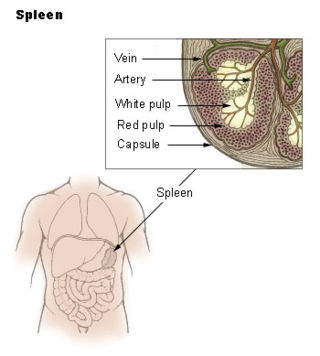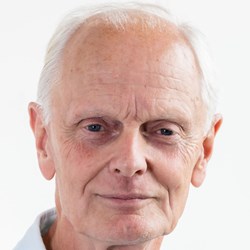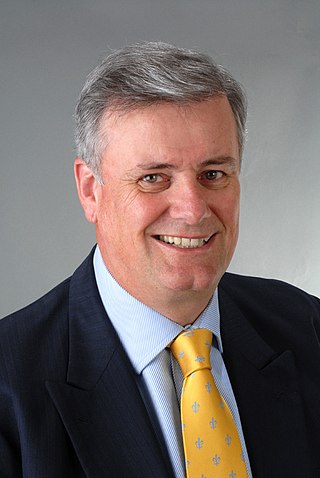Related Research Articles

B cells, also known as B lymphocytes, are a type of white blood cell of the lymphocyte subtype. They function in the humoral immunity component of the adaptive immune system. B cells produce antibody molecules which may be either secreted or inserted into the plasma membrane where they serve as a part of B-cell receptors. When a naïve or memory B cell is activated by an antigen, it proliferates and differentiates into an antibody-secreting effector cell, known as a plasmablast or plasma cell. In addition, B cells present antigens and secrete cytokines. In mammals B cells mature in the bone marrow, which is at the core of most bones. In birds, B cells mature in the bursa of Fabricius, a lymphoid organ where they were first discovered by Chang and Glick, which is why the B stands for bursa and not bone marrow, as commonly believed.

Sir Frank Macfarlane Burnet, usually known as Macfarlane or Mac Burnet, was an Australian virologist known for his contributions to immunology. He won a Nobel Prize in 1960 for predicting acquired immune tolerance. He also developed the theory of clonal selection.

Sir Gustav Victor Joseph Nossal is an Austrian-born Australian research biologist. He is famous for his contributions to the fields of antibody formation and immunological tolerance.
Sir Michael Anthony Epstein was a British pathologist and academic. He was one of the discoverers of the Epstein–Barr virus, along with Yvonne Barr and Bert Achong.

The marginal zone is the region at the interface between the non-lymphoid red pulp and the lymphoid white-pulp of the spleen.

Noreen Elizabeth, Lady Murray was an English molecular geneticist who helped pioneer recombinant DNA technology by creating a series of bacteriophage lambda vectors into which genes could be inserted and expressed in order to examine their function. During her career she was recognised internationally as a pioneer and one of Britain's most distinguished and highly respected molecular geneticists. Until her 2001 retirement she held a personal chair in molecular genetics at the University of Edinburgh. She was president of the Genetical Society, vice president of the Royal Society, and a member of the UK Science and Technology Honours Committee.
The Sir William Dunn School of Pathology is a department within the University of Oxford. Its research programme includes the cellular and molecular biology of pathogens, the immune response, cancer and cardiovascular disease. It teaches undergraduate and graduate courses in the medical sciences.

Marginal-zone B cells are noncirculating mature B cells that in humans segregate anatomically into the marginal zone (MZ) of the spleen and certain other types of lymphoid tissue. The MZ B cells within this region typically express low-affinity polyreactive B-cell receptors (BCR), high levels of IgM, Toll-like receptors (TLRs), CD21, CD1, CD9, CD27 with low to negligible levels of secreted-IgD, CD23, CD5, and CD11b that help to distinguish them phenotypically from follicular (FO) B cells and B1 B cells.
Sir Simon Fraser Campbell is a British chemist.

Peter John Bell Clarricoats was a British engineer who was Professor of Electronic Engineering at Queen Mary, University of London.
Graham John Hutchings CBE FRS FIChemE FRSC FLSW is a British chemist, Professor for Research at Cardiff University.
Doreen Ann Cantrell is a British scientist and Professor of Cellular Immunology at the School of Life Sciences, University of Dundee. She researches the development and activation T lymphocytes, which are key to the understanding the immune response.

Terence Howard Rabbitts is Professor of Molecular Immunology at the Institute of Cancer Research, London.

Peter Malcolm Colman is the head of the structural biology division at the Walter and Eliza Hall Institute of Medical Research in Melbourne, Australia.
Alan Williams FRS was an Australian immunologist noted for his work on the identification and characterization of cell surface receptors that defined different classes of lymphocytes.

Alastair Harvey MacLennan,, MB ChB, MD, FRCOG, FRANZCOG is a Scottish-Australian physician, professor of obstetrics and gynaecology, medical researcher, and a community health advocate. He studied and practised medicine in Glasgow, Chicago, and Oxford before moving to Australia in 1977 to take up a position at the University of Adelaide, where he went on to become the Professor and Head of the Discipline of Obstetrics and Gynaecology in 2006. He retired from his full-time academic position in 2013, and he is now Emeritus Professor of Medicine. He leads research projects at the Robinson Research Institute, and he is Head of the university's Cerebral Palsy Research Group.

The MRC Weatherall Institute of Molecular Medicine at the University of Oxford is a research institute located at the John Radcliffe Hospital in Oxford. Founded in 1989 by Sir David Weatherall, the institute focuses on furthering our understanding of clinical medicine at a molecular level. It was one of the first institutes of its kind in the world to be dedicated to research in this area.
Ian MacLennan may refer to:
Ian Muir may refer to:
References
- ↑ Bott, Simon, ed. (1980). Who's Who of British Scientists 1980/81 (3rd ed.). Simon Books Limited. p. 317. ISBN 9780862290016.
- ↑ "Queen's Birthday Honours List", The Times Higher Education, 17 June 2005, retrieved 4 May 2015
- ↑ "Professor Ian Calman Muir MacLennan CBE FMedSci FRS". The Royal Society. Retrieved 4 May 2015.